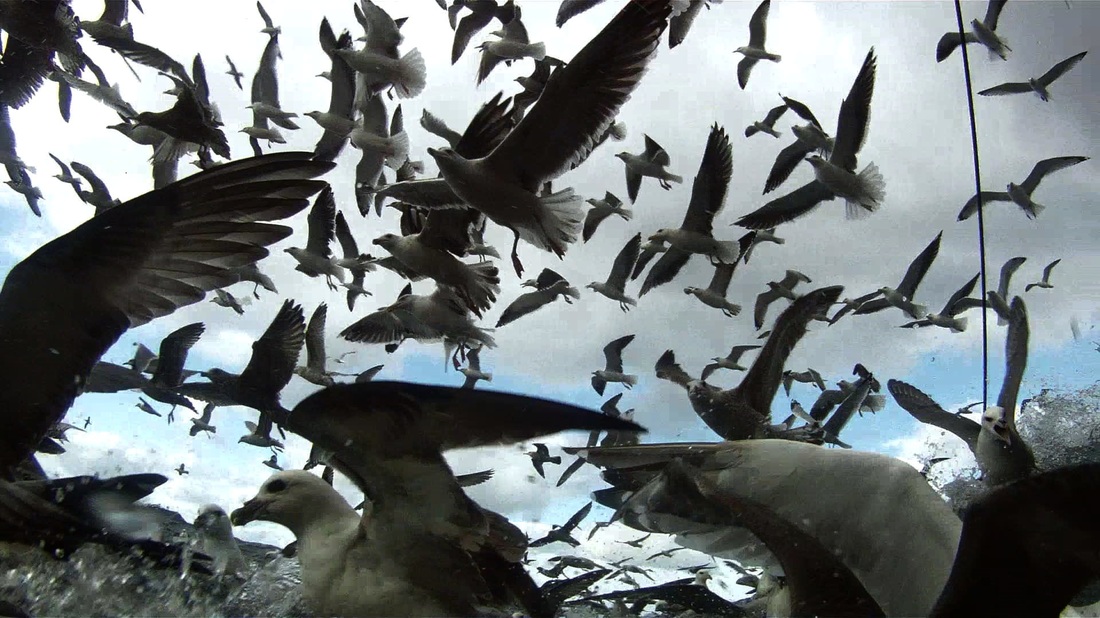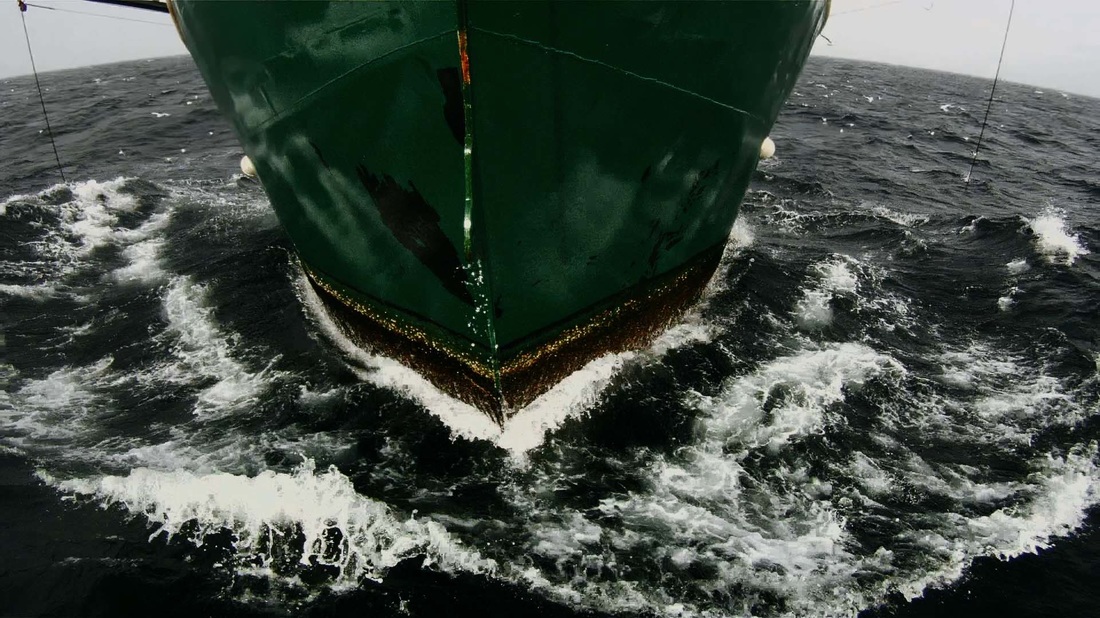Film review: Leviathan (2012)
About a third of the way through Moby Dick, Ishmael describes the delirium he feels when perched in the masthead high above the ship, looking down into the swirling waters below.
"There is no life in thee now, except that rocking life imparted by a gently rolling ship; by her, borrowed from the sea; by the sea, from the inscrutable tides of God. But while this sleep, this dream is on ye, move your foot or hand an inch; slip your hold at all; and your identity comes back in horror. Over Descartian vortices you hover. And perhaps, at mid-day, in the fairest weather, with one half-throttled shriek you drop through that transparent air into the summer sea, no more to rise for ever."
Leviathan, a new film by Lucien Castaing-Taylor and Véréna Paravel, is about contemporary commercial fishing only insofar as Moby Dick is about whaling—that is to say, it isn’t. I didn’t arrive at this connection on my own; Leviathan announces itself as a cinematic descendent of Moby Dick in its opening frames by picking up where Melville’s novel left off: with a quotation from the Book of Job. But if Leviathan is Moby Dick’s long awaited, twenty-first century progeny, it’s a wild child. Even as it acknowledges its thematic lineage, it proclaims its differences, which are the differences between cinema and all other arts that have come before it.
Leviathan was filmed using a fleet of small, remarkably resilient digital cameras held, placed, tied, dragged and thrown in, around and above a hulking commercial fishing vessel over the course of a weeks-long voyage in the North Atlantic. By the filmmakers’ own description, it is a “documentary,” but this term, to my mind, doesn’t fit comfortably. It is not a portrait of life aboard this ship or an attempt to replicate an experience that existed before the film was made. Leviathan isn’t even anchored to any human perspective. In fact, its cameras often transcribe sights no human being could survive witnessing firsthand.
In its brisk 87-minutes of running time, Leviathan accomplishes the disorientation, loss of identity and delirious immersion into pure sensation that Melville’s Ishmael can only allude to. In its memorable opening sequence, we find ourselves balancing precariously on the back deck of the ship as the men haul in massive nets teeming with fish. For a few minutes, we can hardly make out our surroundings in the dark—soon, we can see that dawn is breaking on the horizon. Distending lines whirl all around us like monstrous tentacles, dragging in the nets and sending them back out. As the cameras rotate, navigating through the dark, frenzied blur, we sometimes lose sight of our position in space, but just when all is lost, the sea comes into view again—but not where we thought it would. Maybe it’s closer than we imagined. Maybe, like Ishmael, we suddenly find ourselves dangling high above it, seemingly on the brink of an annihilating drop.
Barring the films of Stan Brakhage, I can’t recall any other work of cinema so intimately connected to its audience’s nervous system. (In fact, if Brakhage had directed a modernization of Moby Dick, I think it would look something like Leviathan.) “Visceral” doesn’t begin to describe the startling impact of Leviathan’s relentless visual and sonic barrage. As cosmic and distanced as its privileged aerial and underwater visions can be, Leviathan also grants us moments of unexpected intimacy. At one point, the camera works its way, in extreme close-up, up the bare arm of a fisherman, lingering over his tattoos and coming to rest on the cobweb-like network of wrinkles around one of his eyes. Later, we suddenly find ourselves in the shower with another fisherman, whose upper body is blurred to the point of near-abstraction by the halo of steam on the camera’s lens. This moment of tender miniaturization follows on the heels of its complete opposite, an astounding shot that faces the front of the ship. As the bow cuts through the waves, the camera bounces up and down, plunging under the water and remerging back to the same sprawling view. Other points in the film make us feel as if we are flying; what’s remarkable here is the camera’s ability to give us weight, to let us feel the pull of gravity dragging us down into the water and the upward surge of momentum that allows us to surface.
The guiding creative principle at work here is the same impulse that led so many early filmmakers, in the infancy of the medium, to strap their cameras to the front of trains. Since then, the technology at the filmmaker’s disposal has come a long way, but the strain of dogged curiosity seems unchanged. It takes a film like Leviathan to remind us that cinema doesn’t have to be simply another window onto the world; it can create views, and worlds that never were.
---------------------------
Double Exposure, 2012

